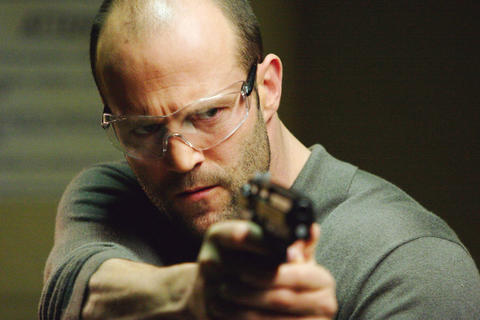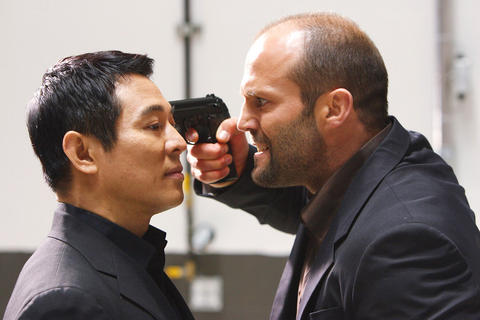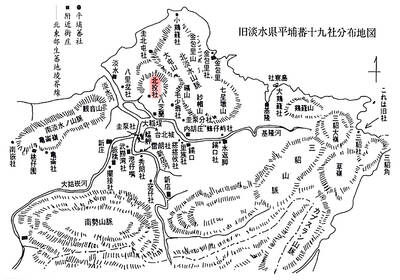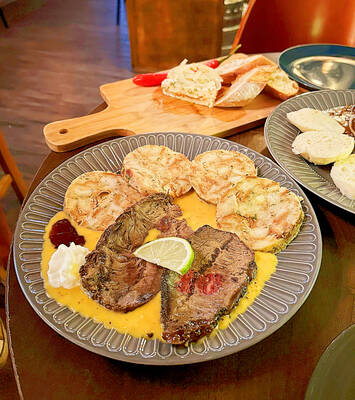You could fill a small junkyard with the films Jet Li (李連杰) and Jason Statham have made separately. Perhaps to cut down on waste, they've teamed up for a single trip to the dumpster. The occasion is War, a title the movie never quite lives up to. Spat or Tiff might be more accurate.
Directed by Philip Atwell, the movie barely utilizes either man's strengths. Statham gets one or two fight sequences (he remains clothed for both) and has dialogue so terrible not even he can trick you into laughing at it. Li, meanwhile, seems to be playing a robot of himself. He barrels dutifully from scene to scene, speaking his halting English with a dispiriting lack of joy. Even his kicks have no crackle. He gives us business when we've come for pleasure.
The screenplay contains a lot of exposition but no explanation. We know this much: the Yakuza and Chinese Triads are at each other's throats over ancient treasures. Li plays a character named Rogue, a psychopath whose pulse never rises. Rogue is also a whore of a hit man – he'll kill anybody on either side of this skirmish if asked. He spends a lot of time with a prissy Triad boss, played by John Lone, who does all he can to take the part seriously ("Revenge is a must!" he snarls).

PHOTO: COURTESY OF WARNER BROTHERS
But Rogue has no problem causing trouble for the boss. He furtively foments conflict between the Triad and the Yakuza, who keep him on their payroll. Conflict even takes the form of a deadly motorbike chase.
It turns out that Rogue has killed the partner of FBI agent, John Crawford, and the partner's family. Crawford has spent years trying to catch the killer. His ex-wife is still annoyed, and her lines could be from Brokeback Mountain Two: "Look, your obsession with this man has cost you your marriage!" (For what it's worth, the movie is set in San Francisco.)
His marriage over, Crawford chases Rogue from one terribly assembled shootout and swordfight to the next. These scenes are so ugly and rushed that we can't figure out what's going on.

PHOTO: COURTESY OF WARNER BROTHERS
No one who's witnessed any of the graceful yet blistering combat in the Bourne movies should stand for action sequences that look like they've been edited with an Uzi.
Fun here is fleeting. Mathew St Patrick, as Crawford's new partner, shows some teasing spontaneity. And Devon Aoki, as the Yakuza head's daughter, has a good scene, holding a knife to one underling and a gun to another, obviously stressed out.
"I just got off a 14-hour flight. I want a salad," she says. "Dressing on the side." The best acting in the whole picture is the confused looks those two dudes give her.

Seven hundred job applications. One interview. Marco Mascaro arrived in Taiwan last year with a PhD in engineering physics and years of experience at a European research center. He thought his Gold Card would guarantee him a foothold in Taiwan’s job market. “It’s marketed as if Taiwan really needs you,” the 33-year-old Italian says. “The reality is that companies here don’t really need us.” The Employment Gold Card was designed to fix Taiwan’s labor shortage by offering foreign professionals a combined resident visa and open work permit valid for three years. But for many, like Mascaro, the welcome mat ends at the door. A

The Western media once again enthusiastically forwarded Beijing’s talking points on Japanese Prime Minister Sanae Takaichi’s comment two weeks ago that an attack by the People’s Republic of China (PRC) on Taiwan was an existential threat to Japan and would trigger Japanese military intervention in defense of Taiwan. The predictable reach for clickbait meant that a string of teachable moments was lost, “like tears in the rain.” Again. The Economist led the way, assigning the blame to the victim. “Takaichi Sanae was bound to rile China sooner rather than later,” the magazine asserted. It then explained: “Japan’s new prime minister is

NOV. 24 to NOV. 30 It wasn’t famine, disaster or war that drove the people of Soansai to flee their homeland, but a blanket-stealing demon. At least that’s how Poan Yu-pie (潘有秘), a resident of the Indigenous settlement of Kipatauw in what is today Taipei’s Beitou District (北投), told it to Japanese anthropologist Kanori Ino in 1897. Unable to sleep out of fear, the villagers built a raft large enough to fit everyone and set sail. They drifted for days before arriving at what is now Shenao Port (深奧) on Taiwan’s north coast,

Divadlo feels like your warm neighborhood slice of home — even if you’ve only ever spent a few days in Prague, like myself. A projector is screening retro animations by Czech director Karel Zeman, the shelves are lined with books and vinyl, and the owner will sit with you to share stories over a glass of pear brandy. The food is also fantastic, not just a new cultural experience but filled with nostalgia, recipes from home and laden with soul-warming carbs, perfect as the weather turns chilly. A Prague native, Kaio Picha has been in Taipei for 13 years and